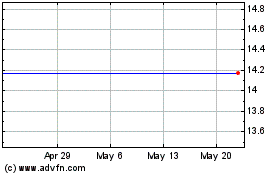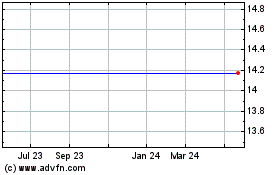New Class of Mutual Fund Shares in Limbo as 'Fiduciary' Rule Is Delayed
March 05 2017 - 12:23PM
Dow Jones News
By Michael Wursthorn and Sarah Krouse
The delay of a rule that tightens standards on brokerages'
retirement-savings advice is disrupting efforts to roll out a new
class of mutual-fund shares designed to comply with the
regulation.
According to some brokerage firms familiar with fund managers'
efforts surrounding these transaction or "T" shares, work to create
them has been delayed or suspended while the Labor Department
reviews the rule for repeal or revision.
The new fund shares would feature uniform sales charges across
all fund categories to help eliminate any pay incentive that might
cause a broker to recommend a higher-cost fund over a
less-expensive similar option in potential violation of the Labor
Department's "fiduciary" rule.
That rule -- which requires advice and sales recommendations in
retirement accounts to be in savers' best interest -- was scheduled
to go into effect April 10, but has been delayed for 60 days beyond
that following an order by the Trump administration to conduct a
review of its economic impact on business and investors. The rule
was expected to make sales fees on some mutual funds, known as
sales loads, and some funds' differing share-class prices
problematic for brokerage accounts that charge investors for each
transaction made.
Now, brokerages that were going to offer the new shares are
being forced to re-evaluate their plans as fund companies halt
their efforts to develop them, people familiar with the matter
said.
Morgan Stanley's wealth-management arm recently told some
employees that many fund companies have "delayed or suspended their
efforts" to develop T shares following the retirement rule's delay,
according to a memorandum viewed by The Wall Street Journal.
"While Morgan Stanley had obtained commitments from the majority
of fund families to develop a class T share within our requested
timeline, we no longer believe that timeline is realistic," the
memo said, adding that the firm no longer expected to offer T
shares next month.
The brokerage arm of Wells Fargo & Co., meanwhile, has been
in contact with fund companies and hasn't made a final decision on
whether it will be able to offer T shares of some mutual funds next
month, people familiar with the matter said.
Fund companies that have already sought regulatory approval to
offer T shares aren't likely to withdraw those requests, people
familiar with their formation say. Instead, the fund firms are
expected to wait and see how the review plays out before deciding
whether to proceed with the T shares' development.
The fiduciary rule, finalized by the Labor Department under
President Barack Obama last year, sought to address the potential
for conflict in advice from brokers, including sales commissions
and other fees charged by funds that could encourage brokers to
sell one fund over another. The Obama administration had said such
conflicts cost investors $17 billion a year.
Many in the financial industry say the Obama administration's
numbers are inflated and the regulation would pare back investment
options, pass along compliance and related costs to savers, and
potentially cut off low-balance customers from some forms of
professional advice.
In response to the rule, many mutual-fund companies sought to
design new mutual-fund shares with uniform charges across all fund
categories so brokerages could continue to sell their products to
commission-paying retirement savers. Typically, T shares would
charge a 2.5% load, or fee, when sold, and a so-called 12b-1 fee of
0.25% to pay for distribution or other expenses, according to
researcher Morningstar Inc. In comparison, the load on an A share
class could be 3.75% or more, according to Morningstar.
Nuveen Investments is among the fund companies that filed plans
with regulators to launch T shares while Janus Capital Group filed
plans for similar P shares. Spokeswomen for the firms declined to
comment.
"Regardless of the technical issues, I'd argue it's
short-sighted for either broker-dealers or asset managers to
abandon T-share efforts simply over uncertainty regarding the Labor
Department's fiduciary rule, " said Ben Phillips, principal at
Casey Quirk, a Deloitte Consulting LLP practice focused on the
asset-management industry, in an email. He added that customer
pressure on costs and transparency remains.
Lord, Abbett & Co. LLC, another fund firm that has applied
for new share classes is "moving forward" with those efforts as it
awaits "greater clarity" on the rule, a firm spokesman said.
--Daisy Maxey contributed to this article.
(END) Dow Jones Newswires
March 05, 2017 13:08 ET (18:08 GMT)
Copyright (c) 2017 Dow Jones & Company, Inc.
Janus (NYSE:JNS)
Historical Stock Chart
From Nov 2024 to Dec 2024

Janus (NYSE:JNS)
Historical Stock Chart
From Dec 2023 to Dec 2024
